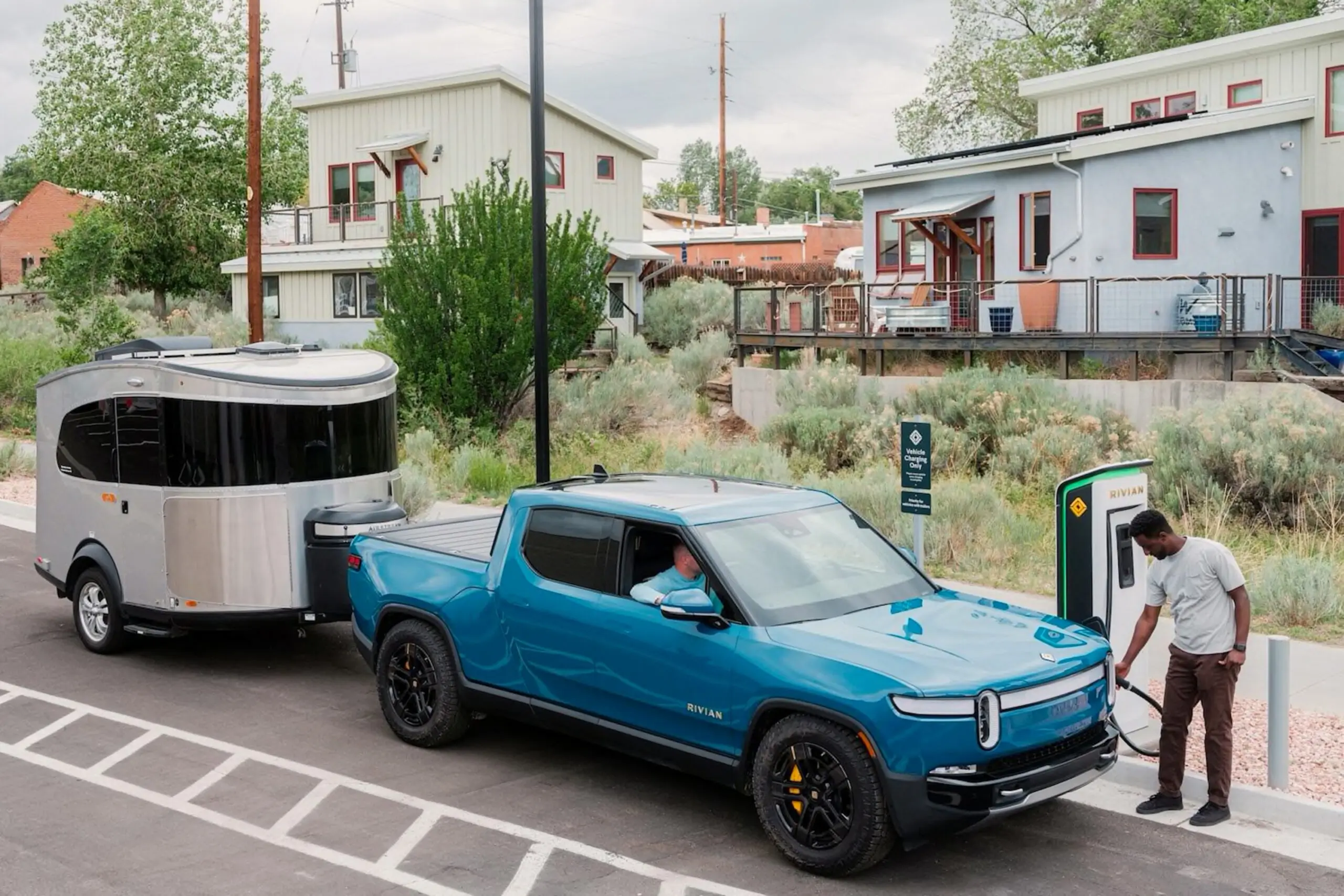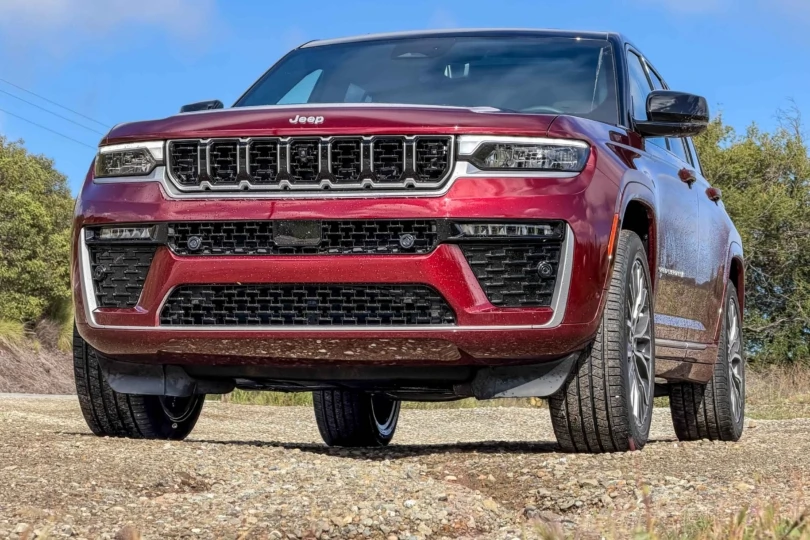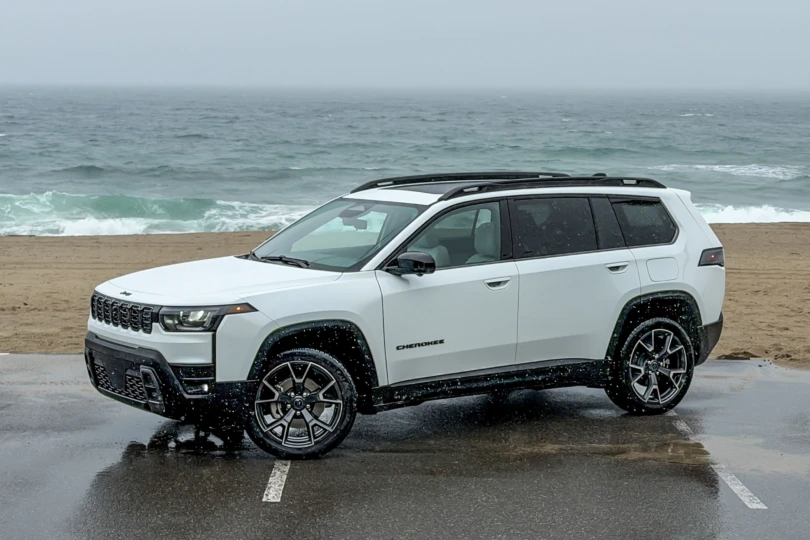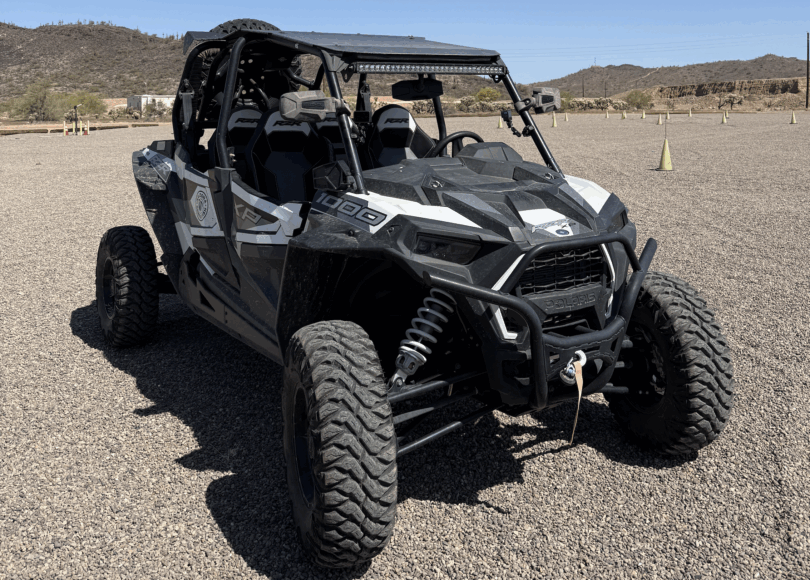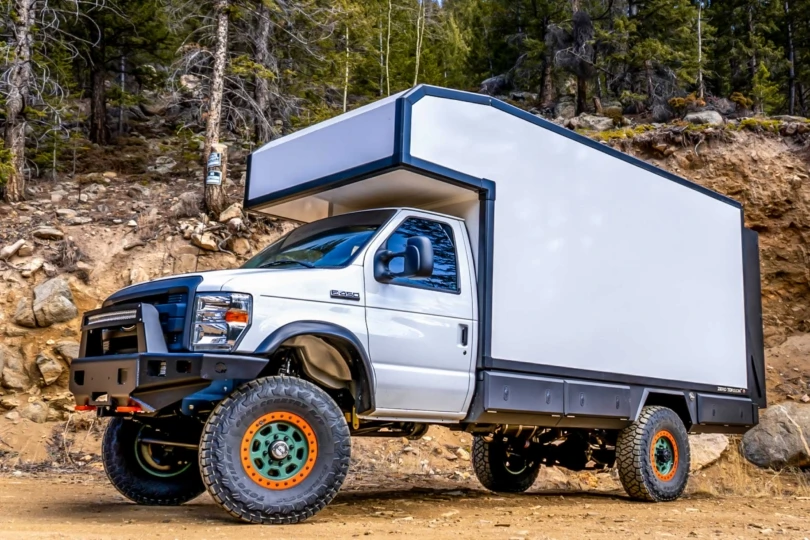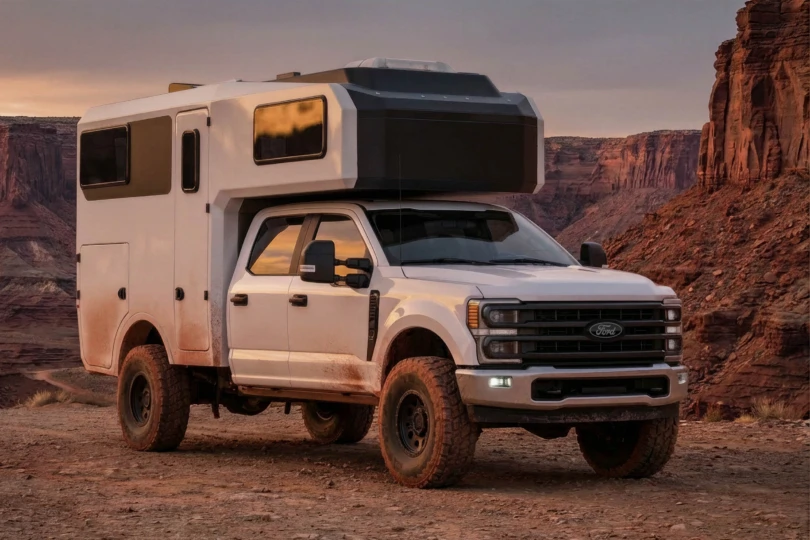In this article, we give you the towing tips and safety concerns you’ll want to know before hitting the road with your trailer.
Teardrops, adventure-style campers, fifth-wheels, and toy haulers — these towable homes away from home are rising in popularity, affording road trippers safe, comfortable lodging.
According to the Recreational Vehicle Industry Association (RVIA), over 46 million Americans planned on taking an RV trip in 2021, with numbers on the rise. The study says those with the greatest interest in such trips are 18-34-year-olds.
That means there are a lot of first-time RVers hitting the road with little or no towing experience, whether with a camper they just purchased or a rental.
Towing Safety 101: Trailer Towing Concerns
Safely towing a trailer requires ensuring that the tow vehicle and trailer are compatible. That’s where “tow ratings” come in. Towing something too heavy or above the factory towing capacity for the vehicle puts the driver and passengers at higher risk of an accident.
The extra weight of the trailer pushing down on the hitch can overwhelm the steering and braking of the tow vehicle, especially when maneuvering for an emergency lane change, cornering at highway speeds, or handling sudden side gusts from passing big rigs.
A trailer that’s above the tow vehicle’s factory towing capacity may also damage the transmission, brakes, axles, and other drivetrain components, and can strain the vehicle’s cooling system.
Therefore, it’s very important for anyone planning to hitch a trailer of any type to understand the basics of tow ratings and towing safely. The last thing anyone wants is their road trip to turn into a trip from hell because of tow vehicle or trailer-related issues.
Weight Carrying vs. Weight Distributing
The first thing to know is how heavy a trailer your vehicle is capable of moving. This basic information can be found in the vehicle owner’s manual.
There, you’ll also find two important terms related to hitches and trailering: weight-carrying and weight-distributing. Understanding the differences between these two types of hitches is critical for your safety and those around you.
The weight-carrying trailer-towing capacity is the maximum weight the particular vehicle can tow in the conventional mode, or with the trailer locked onto the hitch ball on the shank coming out of the hitch. This is the common way that most trailers that weigh less than 3,500 pounds are pulled.
Weight-distributing trailer-towing capacity, on the flip side, is when the trailer is attached to a special, non-factory-supplied, weight-distributing (load-equalizing) hitch assembly.
A weight-distributing hitch utilizes supplemental steel bars, called spring-bars, the ends of which are typically attached to the trailer frame with chains. You see this setup on most RV-type trailers weighing over 5,000 pounds and designed to be attached to the hitch on pickups.
The weight-distributing hitch spring-bars help lift and distribute the weight of a nose-heavy trailer more evenly across the tow vehicle’s front and rear axles, reducing the tendency for the vehicle’s tail to sag. When properly adjusted, this hitch greatly improves the tow vehicle and trailer’s stability and handling characteristics.
A standard (weight-carrying) hitch doesn’t afford such an adjustment. Consequently, a vehicle’s weight-distributing towing capacity, if it has one, will always be significantly higher than its weight-carrying capacity.
Most smaller cars, crossovers, and SUVs’ trailer towing capacities are based on the standard, weight-carrying hitch. This hitch often comes installed from the factory or dealership or can be added as an aftermarket upgrade.
How Towing Capacity Is Determined
Towing a trailer that exceeds the weight-carrying capacity as specified in the vehicle’s owners’ manuals or on the vehicle manufacturer’s website is a very real safety concern. It creates legal liability concerns, which I’ll discuss later.
First, tow ratings. These are set by the vehicle manufacturer at the time the vehicle is built on the assembly line. Tow ratings are like the vehicle’s VIN — once set, that number remains the same regardless of what modifications are made to the vehicle after it leaves the factory.
These ratings are based on extensive lab and field tests conducted by the vehicle manufacturer in accordance with the Society of Automotive Engineers (SAE) J2807 standard, which is a set of real-world tests that determine a vehicle’s safe pulling limits.
This series of tests target handling, trailer sway, braking, accident avoidance maneuvers, acceleration, and the tow vehicle’s component durability. The trials include driving up the Davis Dam, a 7% grade running eastward out of Laughlin, Nevada.
Vehicles are driven for 11 miles to the top of the 3,500-foot summit in daytime temperatures of 100 degrees with the air conditioning going full blast.
When all is said and done, the vehicle manufacturer looks at all the resulting data and decides what towing limits to place on that particular make/model when it is “properly equipped.”
What Does ‘Properly Equipped’ Mean?
Now there are some words with real weight. “Properly equipped” is the automotive version of an electrified fence between towing with the full blessing of the vehicle manufacturer and the opposite.
A properly equipped vehicle has everything the manufacturer deems necessary to haul a certain load: the correct engine and transmission, cooling system, bed and cab configuration (for pickups), axle ratio, and the type of hitch setup, be it conventional (weight-carrying) or weight-distributing.
For example, many half-ton pickups, especially pre-2017 models, are limited to a maximum trailered weight of 5,000 pounds in the weight-carrying mode, while their three-quarter-ton stablemates are limited to less than 10,000 pounds on the ball.
Some Toyota pickup and SUV owners’ manuals state sway-control devices are mandatory on trailers weighing more than 2,000 pounds and limit hauling speeds to less than 45 mph.
Nissan’s towing guide “strongly recommends” the use of a sway-control device for all of their pickups and SUVs not equipped with Vehicle Dynamic Control (VDC) when towing trailers weighing more than 2,000 pounds.
Finding Your Vehicle’s Tow Ratings
Every vehicle manufacturer has a special website that explains and defines tow ratings and towing equipment requirements. Good search words to find them are the vehicle manufacturer name followed by “RV and trailer towing,” “towing guide,” and “RV towing guide.”
Odd as it seems, such information isn’t always easy to find. For some reason, a few big vehicle manufacturers place tow ratings and towing requirements on their fleet websites, but not on the consumer side.
For example, Ford has its detailed towing data for 2004-2021 vehicles on the fleet site under Towing Guides. GM keeps theirs under Trailering Guide on the fleet website and FCA/RAM Truck in the Towing & Payload Capacity section. (Check here for Nissan, Toyota, Mazda, and Honda towing guidelines.)
Tongue Weight: The Real Concern
One trailering item consistent across the board for all vehicles with factory tow ratings is the vehicle’s tongue weight (TW) capacity. Tongue weight, expressed in pounds, is the downward force a trailer’s tongue places on the hitch ball and, therefore, on the rear of the tow vehicle. The right setup requires 10-15% of the trailer’s weight to be on the hitch.
The greater the tongue-weight, the more the rear of the vehicle drops and the front rises. Too little weight up front creates steering and braking problems.
The smaller and lighter the tow vehicle, the more important it is to pay close attention to how much tongue weight the trailer is putting on the hitch. Generally, it’s best to keep the trailer tongue weight 15-20% less than your tow vehicle’s maximum TW capacity.
Towing Safety & Liability
Like weight-carrying and weight-distributing ratings, tongue-weight has been derived by both the vehicle and the hitch manufacturer as the safe limit for that product. Towing a trailer above the tongue-weight specified by the vehicle manufacturer classifies the vehicle driver as being negligent. That means the driver may be liable in the event of an accident.
As the online Dodge towing guide states, “Incorrect tongue weight could result in increased yaw or vehicle instability. A negative tongue weight could unload the rear suspension of the tow vehicle, decreasing vehicle stability.”
If the weight of the trailer, the tongue-weight or hitch load limitations as established by the manufacturer are not adhered to, the driver of the tow vehicle is considered to be towing in a negligent manner. Check with your insurance company on the legalities.
Surge-Brake Trailers
Trailers weighing more than 3,000 pounds are required to have brakes. The conundrum here is even if you abide by tongue-weights and use a weight-distributing hitch to meet the “properly equipped” standard, your towing setup may still not be correct. It’s all about the trailer braking system.
Most RV camper trailers utilize electric brakes. But there are many boat, teardrop, and off-road adventure-style trailers on the market equipped with surge-type brakes. Surge-type brakes have a hydraulic master cylinder in the trailer tongue that uses the force of the trailer pushing against the tow vehicle to apply the brakes.
An issue here is the majority of weight-distributing hitches can interfere with (or disable) the surge-type brake system functioning properly. Sway-control devices, like those required by many of the smaller SUVs and pickups to tow larger loads, virtually stop a surge-brake system from working at all.
The good news is both Equal-i-zer and Reese SC offer special weight-distributing hitches designed for use with surge-brake-equipped trailers.
Manufacturer-Induced Confusion
Don’t blame yourself for not knowing all these little caveats about towing. Automotive manufacturers are always pushing for a marketing edge, and tow ratings play a big role in that edge.
Regardless of the difference between competing vehicles, the one with the bigger towing capacity is perceived by many as being the better vehicle.
That’s why almost every ad you see shows a pickup or SUV towing something near its upper limits. The vehicle being shown is properly equipped, as the superfine print under the ad says. This leads the average buyer to believe their own vehicle can do the same. And, it can — as long as it is properly equipped for the trailer being towed.
No Escaping Towing Safety Ratings
Be smart. Do your homework. Find out what your vehicle can pull and what it needs to do so. Trailer weight capacity issues create some interesting towing calculations and confusing legal issues for anyone who attaches a trailer to a hitch.
And, no, you can’t work around a vehicle’s towing capacity limitations by upgrading to a stronger hitch, say from a Class II to a Class III, or a Class III to a Class IV or V. The same is true for adding helper springs, air-adjustable shocks, or airbags for additional rear suspension lift/support.
We have to live with and abide by the tow ratings the vehicle manufacturers set. If you ignore the vehicle’s tow ratings, and words such as “properly equipped” and “weight-carrying limit,” then you assume all responsibility for what happens on your road trip. Tow smart. Tow safe.









